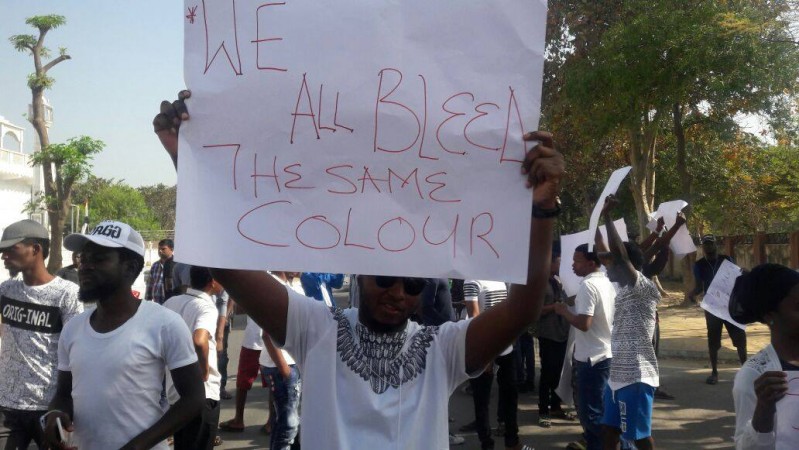A video has surfaced recently which brings out the worst of humanity. It features a brutal mob attacking Nigerian nationals in a Noida mall. Watching it is an exercise of ultimate outrage and mind numbing fear. It combines the racial hatred with violence of the mob. It proves what we have perhaps always known, but have not admitted openly, that as a nation we are racially intolerant, narrow-minded hateful people. Also, the mobs, the collectives, bring out the worst in us. Shorn of individual responsibility, we become shameful, spiteful selves, whether it is mass molestation of girls in Bangalore or beating up other races. Not only do we lose sense of responsibility or empathy but also rationality.
The attack was motivated by belief that the Nigerian nationals were responsible for death of a student through drug overdose. Arrests were made but the suspects were let off due to lack of evidence. This is when the vigilante mob decided to take matters in their own hands. As a group, with diminished sense of individual rationality and anger multiplied manifold, the people inflicted their own brand of cruel justice.
Vigilantism has existed since centuries and thrived in areas where there was an absent state. This brand of quick justice is often based in little verification of facts, or due processes to establish guilt. Depending on the collective mob mentality and easy sway of influencers the crowd seeks to substitute the role of courts and the state. The people are influenced by prevailing stereotypes, prejudices, fears, and beliefs of the society. Media and technology often aids in spreading rumours and fuelling panic. Sometimes the crowd may even have the tacit support of local power. Hysteria fuels into call for action and the ‘punishment’ inflicted is often much more in proportion to the said ‘crime’.
India, with its socially and culturally diverse fabric has meant that unfortunately it is also very vulnerable to such incidents. Combine this with local elements holding quasi-political and quasi-legal power and there is always the danger of violence. For instance, kangaroo courts while have no state recognition, have significant sway over the community. They have served their own regressive brand of vigilante justice by sanctioning killings of young couples and caste violence.
Similarly various religious/caste outfits have incited communities to clashes on pretext of local incidents based on rumour mongering and hysteria and the need to ‘take matters in own hand’. Acting on their personal prejudices and on encouragement of the mob, people have variously attacked students (the recent violence in various universities across the country), people from north east (which has even prompted exodus of students), people from different castes (the beating up of Dalits and caste violence) and religion (various communal riots). Mobs have torched government or private buildings and buses, thrown rocks at houses of sportsmen (Dhoni, Yuvraj are among some who faced this), and vandalised movie halls and sets (protests against ‘My Name is Khan’ and ‘Padmavati’).
So where does this leave us as a society? Are we really all racists, xenophobes inside waiting for the indemnity of the crowd to set it free? Does collective responsibility diminish or absolve individual guilt? When people join the crowd or even observe as mute spectators as buildings are torched and people beaten up, are we really giving action to the prejudices that have always lived inside us? Is society as a sum of individuals really better than the individuals who constitute it? When people from other races, regions, caste, or religion are beaten up is it society unleashing its narrow-minded insecurity and fear/hatred for the ‘other’? And how are mostly rational, thinking individuals so easily swayed by rumours and misinformation?
Or is the problem more structural? Have people become social vigilantes to serve their own brand of justice because they think they can get away with it? It may part be due to erosion of faith in law and state and partly due to a cultural climate that encourages trial and punishment by mainstream and social media. Living in the world of post truth and alternative news, this is not hard to believe. Spectacle and propaganda is often more appealing than hard facts and the long due processes of the law. Moreover, lack of accountability of the social vigilantes may mean that the fringe may end up being mainstream, and we may have a new normal.
To prevent this, and save the foundations of rule of law and democracy, the government needs to step in with strict injunctions. The state and the society need to have a zero tolerance policy towards anyone who is taking ‘punishment’ in their own hands. Most importantly it requires a vivisection of our own prejudices about race, caste and religion. However that is a tortuous, introspective process and will take its own time. It will involve asking ourselves after every act of violence: how culpable are we?
Disclaimer: The opinions expressed in this article are the personal opinions of the author. The facts and opinions appearing in the article do not reflect the views of NEWSD and NEWSD does not assume any responsibility or liability for the same.


















